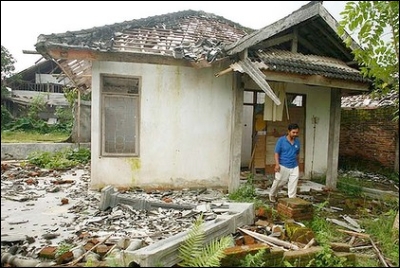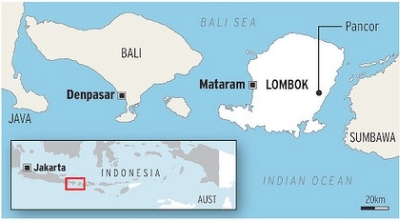World |
Tolerance for religions tested in Indonesia
February 12, 2011s

Moved from place to place … there are about 135 followers of the Ahmadiyah faith at the decrepit Mataram refugee camp, West Lombok. Photo: Murdani Usman
Politicians condemn attacks on Ahmadiyah followers but nothing seems to be done, writes Tom Allard in Mataram, Lombok.
THE killing of three followers of the Ahmadiyah faith by a frenzied group of Islamists this week has left Indonesia reflecting on how closely it lives up to its national credo “unity in diversity”.
Captured in horrific detail, on video taken with a mobile phone, were the bodies of three men, stripped naked, being battered by stones and staves as hundreds of onlookers cheer. The police either stand back or, in the case of one officer, try half-heartedly to shoo away the attackers.
It was grotesque, stomach-churning stuff and it was widely circulated throughout the country. Then, two days later, a marauding mob of militants attacked churches and torched vehicles in Central Java, upset that a man who had been found to have blasphemed Islam was given a five-year sentence and not death.
The country’s reputation for religious harmony, lauded by the US President, Barack Obama, as “inspiring” and an “example to the world” on his historic visit to his boyhood home last year, was in tatters.
After the violence, came the self-examination.
The Indonesian President, Susilo Bambang Yudhoyono, condemned the violence as “intolerable” and vowed a full investigation. Many Islamic leaders also voiced their abhorrence and there were searing and soul-searching editorials in the media.
Yet the response of many politicians and officials to the murder of the Ahmadis was deeply unsettling, betraying sentiments that have underpinned the apparent disregard of authorities to an escalation of anti-Ahmadiyah violence evident across Indonesia for years.
The Ahmadiyah faith is a variant of Islam that follows the teachings of the Koran but regards an Indian preacher, Mirza Ghulam Ahmad, as a “messiah” who followed the prophet Muhammad. But Imran Muchtar, a parliamentarian from Dr Yudhoyono’s Democratic Party, said its members “should repent”.
Hazrul Azwar, a politician from an Islamic party in Dr Yudhoyono’s coalition, bemoaned that “the fake prophet is a disgrace to my religion. Clerics in the whole world have banned Ahmadiyah, why is the government not doing the same thing?“
Suryadharma Ali, the Religious Affairs Minister who has called for the group to be outlawed, said “the government hasn’t made any decision on what to do [but] the suggestion to disband the Ahmadiyah will be a very valuable input for us”.
Put simply, for many, the Ahmadiyah, which has about 200,000 adherents in Indonesia and has been here since 1925, have brought their problems on themselves.
In West Lombok, where some of the worst treatment of Ahmadis has been meted out in recent years, a government spokesman, Ispan Junaidi, explained the conflict with: “The Ahmadiyah, they don’t socialise, they kept to their group and never blend in with the locals.”
In Mataram, the capital of the district, Ahmadis driven from their homes live in a decrepit refugee centre, families packed into tiny cubicles fashioned from bamboo and rattan inside a crumbling building.
Clutching his grandson, Harun, a fisherman, sums up a life on the move since his village, Kruak, was first attacked in 1998. He had lived peacefully there for more than 15 years, he says, when, with no warning, a group of 50 men from outside Kruak destroyed the homes and prayer room of 15 Ahmadis.
He moved to Pancor, another small village. In 2002, the Ahmadis were attacked again by a group of teenagers.
“The next time they came, it wasn’t just teens, it was everybody,” recalled Udin, also from Pancor. “Brimob [the elite mobile police force whose job it is to quell riots] came. They suggested we take refuge elsewhere and said they would calm things, look after everything.
“The police stayed but they joined in and took everything. Over the next three nights, 70 houses were destroyed.”
Harun and some of the other Ahmadis then shifted to Gegerung, moving into a housing development that no one would inhabit because it was on the edge of a sandmine and close to a cemetery.
In the beginning, it seemed they had found a safe place. The locals were welcoming. The Ahmadis and orthodox Muslims celebrated Id-ul-Fitr, the major Muslim holiday, together and everyone pitched in to build a new mosque. In 2006, a group of Islamists destroyed their homes. The Ahmadis returned to rebuild and were attacked again in November. “It is very sad. I don’t understand why this happens and why the police do nothing,” said Harun.
Rather than attempt to find and prosecute the perpetrators and their ideological leaders, or enforce the rights of the Ahmadis to return to their homes, authorities here have proposed to send them to a desert island, Gili Tangkong.
It would be exile in their own country, says Sahidin, another Amhadi at the shelter. “I have been there. It is 300 metres long. It has no fresh water,” he said. “It’s small, and not liveable. Why can’t we return to our homes?“
While they bide their time in the Mataram shelter, West Lombok’s Ahmadis can’t get replacements for the identity cards destroyed in the attacks. That means they can’t open a bank account, let alone get a loan. The children don’t have birth certificates.
The Ahmadis can’t travel, get a driver’s licence, buy property or find a job in the formal economy.
The reason for the lack of documents is that Indonesians must list their religion on the cards and Ahmadiyah is not one of the six recognised faiths: Islam, Hinduism, Catholicism, Protestantism, Buddhism and Confucianism.
It’s this kind of prescriptive approach to its citizens practising their faith that undermines Indonesia’s secularism, enshrined in its constitution.
So too does a controversial blasphemy law, and decrees of the ministry of religious affairs, like the one in 2008 that banned Ahmadis from proselytising.
Yenny Wahid, the daughter of Indonesia’s great, late Islamic leader and former president, Gus Dur, said the decree has contributed to the worsening of attacks against Ahmadis.
THE killing of three followers of the Ahmadiyah faith by a frenzied group of Islamists this week has left Indonesia reflecting on how closely it lives up to its national credo “unity in diversity”.
Captured in horrific detail, on video taken with a mobile phone, were the bodies of three men, stripped naked, being battered by stones and staves as hundreds of onlookers cheer. The police either stand back or, in the case of one officer, try half-heartedly to shoo away the attackers.
It was grotesque, stomach-churning stuff and it was widely circulated throughout the country. Then, two days later, a marauding mob of militants attacked churches and torched vehicles in Central Java, upset that a man who had been found to have blasphemed Islam was given a five-year sentence and not death.
The country’s reputation for religious harmony, lauded by the US President, Barack Obama, as “inspiring” and an “example to the world” on his historic visit to his boyhood home last year, was in tatters.
After the violence, came the self-examination.
The Indonesian President, Susilo Bambang Yudhoyono, condemned the violence as “intolerable” and vowed a full investigation. Many Islamic leaders also voiced their abhorrence and there were searing and soul-searching editorials in the media.
Yet the response of many politicians and officials to the murder of the Ahmadis was deeply unsettling, betraying sentiments that have underpinned the apparent disregard of authorities to an escalation of anti-Ahmadiyah violence evident across Indonesia for years.
The Ahmadiyah faith is a variant of Islam that follows the teachings of the Koran but regards an Indian preacher, Mirza Ghulam Ahmad, as a “messiah” who followed the prophet Muhammad. But Imran Muchtar, a parliamentarian from Dr Yudhoyono’s Democratic Party, said its members “should repent”.
Hazrul Azwar, a politician from an Islamic party in Dr Yudhoyono’s coalition, bemoaned that “the fake prophet is a disgrace to my religion. Clerics in the whole world have banned Ahmadiyah, why is the government not doing the same thing?“
Suryadharma Ali, the Religious Affairs Minister who has called for the group to be outlawed, said “the government hasn’t made any decision on what to do [but] the suggestion to disband the Ahmadiyah will be a very valuable input for us”.
Put simply, for many, the Ahmadiyah, which has about 200,000 adherents in Indonesia and has been here since 1925, have brought their problems on themselves.
In West Lombok, where some of the worst treatment of Ahmadis has been meted out in recent years, a government spokesman, Ispan Junaidi, explained the conflict with: “The Ahmadiyah, they don’t socialise, they kept to their group and never blend in with the locals.”
In Mataram, the capital of the district, Ahmadis driven from their homes live in a decrepit refugee centre, families packed into tiny cubicles fashioned from bamboo and rattan inside a crumbling building.
Clutching his grandson, Harun, a fisherman, sums up a life on the move since his village, Kruak, was first attacked in 1998. He had lived peacefully there for more than 15 years, he says, when, with no warning, a group of 50 men from outside Kruak destroyed the homes and prayer room of 15 Ahmadis.
He moved to Pancor, another small village. In 2002, the Ahmadis were attacked again by a group of teenagers.
“The next time they came, it wasn’t just teens, it was everybody,” recalled Udin, also from Pancor. “Brimob [the elite mobile police force whose job it is to quell riots] came. They suggested we take refuge elsewhere and said they would calm things, look after everything.
“The police stayed but they joined in and took everything. Over the next three nights, 70 houses were destroyed.”
Harun and some of the other Ahmadis then shifted to Gegerung, moving into a housing development that no one would inhabit because it was on the edge of a sandmine and close to a cemetery.
In the beginning, it seemed they had found a safe place. The locals were welcoming. The Ahmadis and orthodox Muslims celebrated Id-ul-Fitr, the major Muslim holiday, together and everyone pitched in to build a new mosque. In 2006, a group of Islamists destroyed their homes. The Ahmadis returned to rebuild and were attacked again in November. “It is very sad. I don’t understand why this happens and why the police do nothing,” said Harun.
Rather than attempt to find and prosecute the perpetrators and their ideological leaders, or enforce the rights of the Ahmadis to return to their homes, authorities here have proposed to send them to a desert island, Gili Tangkong.
It would be exile in their own country, says Sahidin, another Amhadi at the shelter. “I have been there. It is 300 metres long. It has no fresh water,” he said. “It’s small, and not liveable. Why can’t we return to our homes?“
While they bide their time in the Mataram shelter, West Lombok’s Ahmadis can’t get replacements for the identity cards destroyed in the attacks. That means they can’t open a bank account, let alone get a loan. The children don’t have birth certificates.
The Ahmadis can’t travel, get a driver’s licence, buy property or find a job in the formal economy.
The reason for the lack of documents is that Indonesians must list their religion on the cards and Ahmadiyah is not one of the six recognised faiths: Islam, Hinduism, Catholicism, Protestantism, Buddhism and Confucianism.
It’s this kind of prescriptive approach to its citizens practising their faith that undermines Indonesia’s secularism, enshrined in its constitution.
So too does a controversial blasphemy law, and decrees of the ministry of religious affairs, like the one in 2008 that banned Ahmadis from proselytising.
Yenny Wahid, the daughter of Indonesia’s great, late Islamic leader and former president, Gus Dur, said the decree has contributed to the worsening of attacks against Ahmadis.
Copyright © 2011 Fairfax Media
URL: www.smh.com.au/world/tolerance...20110211-1aqiz.html
URL: www.smh.com.au/world/tolerance...20110211-1aqiz.html











